- 37% of people with incomes over 5,000 PLN who buy luxury goods read at least ten press titles.
- Another 30% in this group regularly read between four and nine titles.
- "Reading the press is an aspect of cultural capital, which is inherently linked to wealthy individuals or those with incomes over 5,000 PLN," says Waldemar Izdebski, president of Polish Readership Research, to Newseria Biznes. - "While the readership rate for certain press titles may be 6-7% across the country, in this group, it reaches 10-15%."
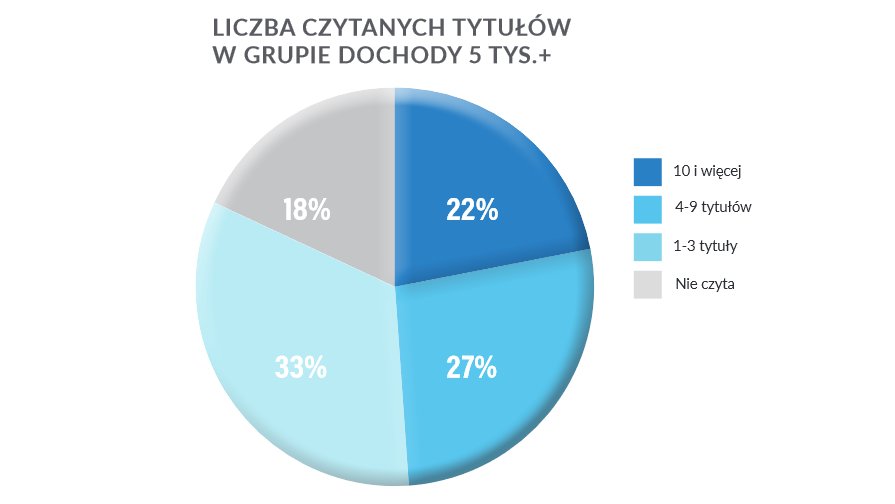 source: “Luxury Loves the Press,” Polish Readership Research 2017
source: “Luxury Loves the Press,” Polish Readership Research 2017People with incomes over 5,000 PLN are classified as affluent, with 80% of them purchasing luxury brands. This represents 4.7% of the Polish population aged 18-59, or about 1.05 million people. Additionally, 290,000 Poles earn over 14,000 PLN monthly and are considered wealthy.
- In the affluent group, 45% read the press for at least an hour daily, while in the wealthy group, this figure rises to 54%.
- Over two-thirds of affluent readers choose monthly magazines, compared to 44% of the general Polish population (average issue readership rate).
- A third of those with incomes above 5,000 PLN read daily newspapers, while the national average is 15%.
- "These findings challenge the outdated stereotype of the affluent as nouveau riche,” comments Prof. Dominika Maison from the University of Warsaw, president of Maison & Partners, in a statement to Newseria Biznes. - "The wealthy in Poland are increasingly becoming an elite: well-educated individuals who often achieved their position through knowledge, professionalism, and competence. They travel more frequently than most Poles and are regular readers of both opinion-forming and lifestyle press."
The report from Polish Readership Research also reveals another interesting insight: as wealth increases, television viewership declines, while press readership grows.
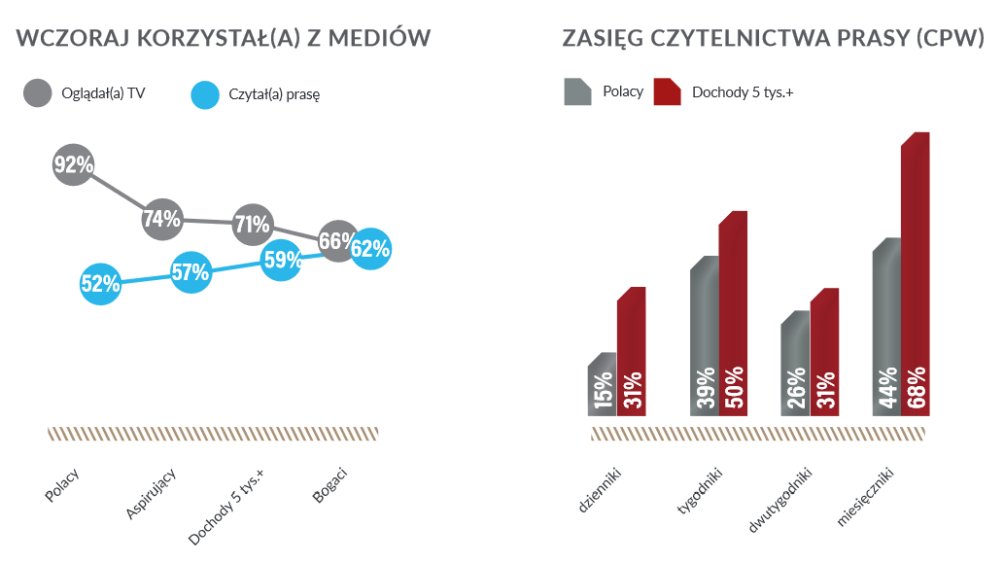 source: “Luxury Loves the Press,” Polish Readership Research 2017
source: “Luxury Loves the Press,” Polish Readership Research 2017Affluent and wealthy readers enjoy a wide range of press titles. Research by PBC disproves stereotypes suggesting that popular press primarily targets low-income groups.
- "The press, regardless of its theme, is aimed at both the middle and upper classes. This includes economic publications, opinion weeklies, exclusive monthlies, as well as more popular titles like computer or automotive magazines," explains Waldemar Izdebski. - "It’s not that the upper class rejects certain titles, but rather they read them less regularly."
What Wealthy Poles Read
Readership of major press titles is several times higher among people with incomes over 5,000 PLN compared to the general Polish population. The most popular newspaper among both men and women is Gazeta Wyborcza, with readership among affluent individuals being three and a half times higher than the overall market reach.
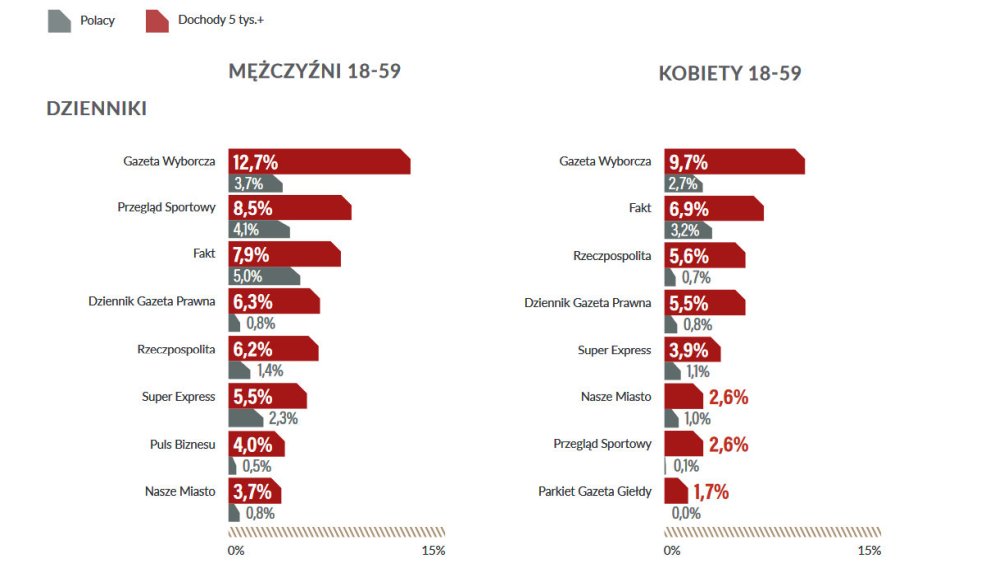 source: “Luxury Loves the Press,” Polish Readership Research 2017
source: “Luxury Loves the Press,” Polish Readership Research 2017Among weeklies, Newsweek holds the top spot for affluent Poles, slightly ahead of Tele Tydzień. Among affluent women, the ranking is reversed. Weeklies are the only group where the most popular titles among affluent readers have lower readership rates than the general market, particularly among affluent women who read Tele Tydzień, Życie na gorąco, and Chwila dla Ciebie.
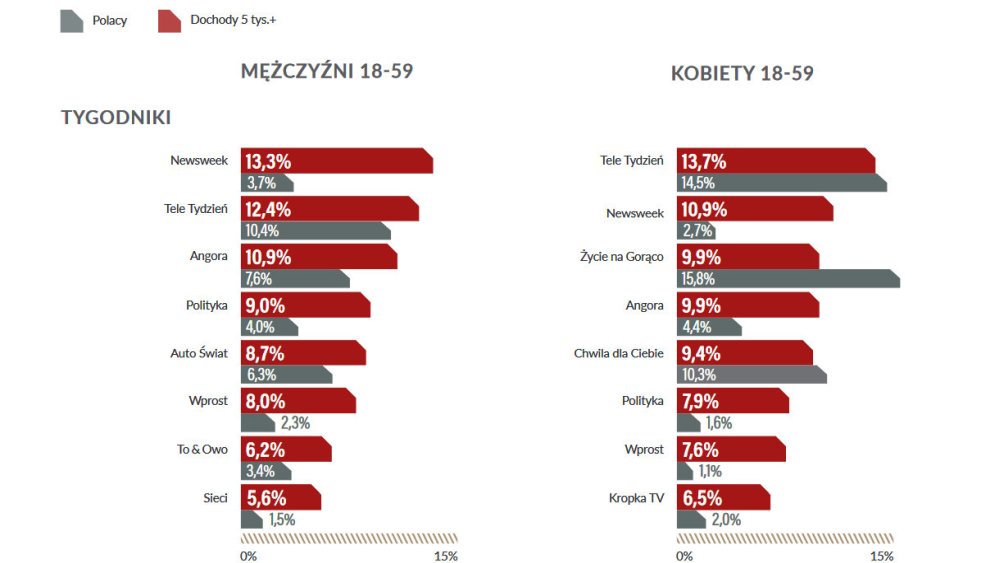 source: “Luxury Loves the Press,” Polish Readership Research 2017
source: “Luxury Loves the Press,” Polish Readership Research 2017In the monthly magazine category, the average readership rate for a single issue among those earning over 5,000 PLN ranges from 8-15%. Men prefer Komputer Świat, National Geographic, and Murator. Among women, the most popular titles are Twój Styl, Skarb, and again, National Geographic.
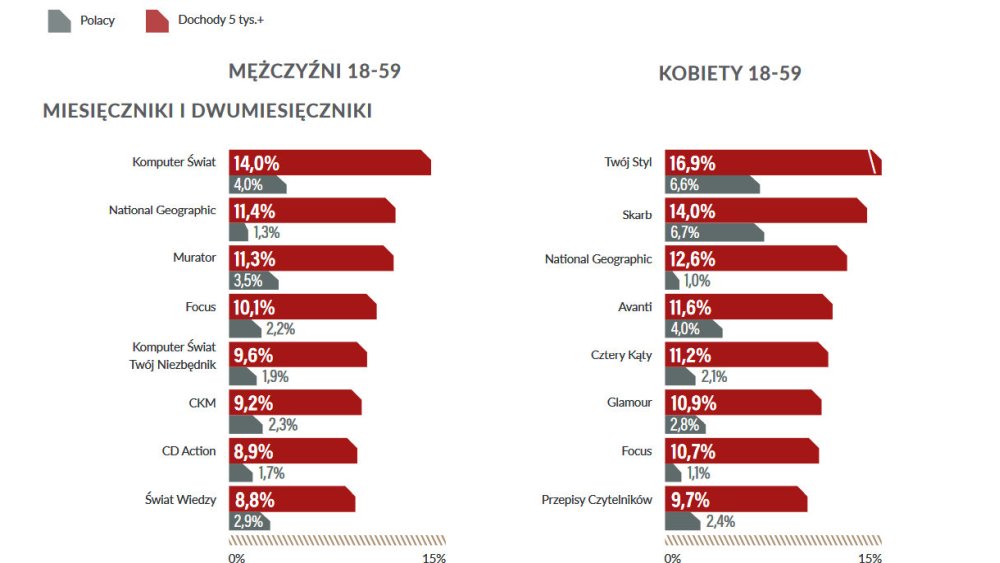 source: “Luxury Loves the Press,” Polish Readership Research 2017
source: “Luxury Loves the Press,” Polish Readership Research 2017The precise targeting of readership and press titles can be an effective tool for planning luxury brand campaigns, highlight the authors of the PBC report. Determining a title’s reach is essential.
The full “Luxury Loves the Press” report is available on the PBC website: https://www.pbc.pl
COMMERCIAL BREAK
New articles in section Media industry
Tags, hashtags and links in video descriptions. Youtube SEO after Gemini AI update [ANALYSIS]
BARD
Once, positioning a video on Youtube was simple. It was enough to stuff the description with keywords and wait for results. Those days are not coming back. In 2026, the algorithm is no longer a simple search engine that connects dots. It is the powerful Gemini AI artificial intelligence that understands your video better than you do.
Freelancers 2025 in media and advertising. Useme report
Krzysztof Fiedorek
The modern media and communication market presents entirely new challenges for independent creators. Traditional services are giving way to more complex forms of messaging. The most popular industries in which Polish freelancers operate focus on companies' online presence and visual content.
Video content in Poland. What and how we watch
Paweł Sobczak
Video content is watched remotely, but streaming services are mainly enjoyed in the comfort of home. This is how the consumption of audiovisual content by Poles in 2025 can be summarized. This is the result of an analysis of a study conducted by SW Research and data from the company MEGOGO.
See articles on a similar topic:
Fake News and Disinformation in Poland. Scale, Impact and Future
Bartłomiej Dwornik
Where do the sources of disinformation lie, and how large is the scale of this wave? Why are we so susceptible to false information, and what role do traditional media play in this puzzle? Let’s shed some light on these issues and face the question: can the battle against the flood of disinformation still be won?
Social Media and Relationships. Interesting Research from Palestine
KFi
What does love look like in the digital age? Does technology bring people closer or push them apart? In an era where Facebook and Instagram replace dinner table conversations, social media has become a new space for marital relationships. Researchers from An-Najah National University examined how technology can build bonds but also sow uncertainty.
We Trust AI-Generated Fake News More Than Human-Created News
KrzysztoF
Generating and spreading misinformation with AI can negatively affect various areas of life, including global healthcare. To examine how AI-created text impacts the comprehension of information, researchers from the University of Zurich analyzed tweets generated by GPT-3.
Blogs in E-commerce. Report by Elephate and Senuto
KrzysztoF
The average number of indexed articles on e-commerce blogs is 565, with each post attracting 347 readers per month. The health industry generates the highest organic traffic per single article. The authors of the "E-commerce Blog Ranking" take a behind-the-scenes look at the commercial blogosphere.





























